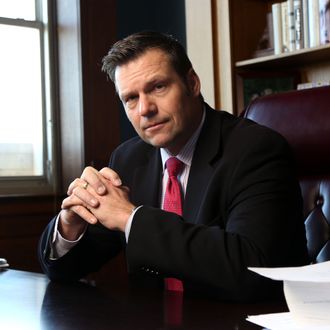
There are a lot of policies that President Trump could enact on day one, but it did not seem like building his beautiful southern border wall was one of them. The U.S. already spent billions to merely fence off about a third of the border, and attempting to construct a concrete wall could cost as much as $25 billion. Even with Republicans in control, that’s not something that’s going to move through Congress swiftly.
But according to one member of Trump’s transition team – who’s rumored to be a top contender for attorney general – his immigration advisers have already worked out how to start on the wall without any help from Congress.
Kansas secretary of State Kris Kobach tells Reuters that he has been holding conference calls with about a dozen Trump immigration advisers for the past few months, and they believe the Homeland Security Department can reappropriate funds from its current budget to begin construction immediately. Congress would likely balk at this, and he acknowledged “that future fiscal years will require additional appropriations.”
According to Kobach, the team has also been looking at how to implement Trump’s vague plan for the “extreme vetting” of Muslims entering the country. One possibility: simply reinstate the post-9/11 registry of Muslims entering the country on visas from countries that pose a terror threat.
Under the 2002 National Security Entry-Exit Registration System, which Kobach helped design, people from “higher risk” countries were interrogated and fingerprinted upon entering the country. The “special registration” program required some noncitizen males over the age of 16 to register in person and occasionally notify the government of their whereabouts.
Following complaints that the program violated civil liberties and was discriminatory toward Muslims, the special registration program ended in 2003.
“It was clearly discriminatory because the nations listed were only Arab and Muslim nations,” Abed Ayoub, the national legal and policy director of the American-Arab Anti-Discrimination Committee, told The Wall Street Journal. “They just put in North Korea for good measure.”
The Obama administration ended the rest of the NSEER requirements in 2011, but it accomplished that by removing all the countries from the list. Technically, the regulation is still on the books.
Presumably, this is just a small peek at the proposals Kobach is preparing for President Trump. He’s known for drafting extreme immigration laws, such as Arizona’s “show me your papers” law, which was struck down by the Supreme Court. He’s also passionate about fighting voter fraud, though there’s little evidence that it exists. He pushed for a 2013 Kansas law that required people to provide documents proving their citizenship in order to register to vote, which was also overturned by the courts.
Kobach has taken credit for the idea that Mexico would pay for the wall, and he seems like a perfect fit for Trump’s cabinet — even when it comes to the controversy his nomination would generate. In 2015, he spoke before the Social Contract Press, which the Southern Poverty Law Center classifies as a white nationalist group, saying:
Recent articles in its main product, The Social Contract, have propagated the myth that Latino activists want to occupy and ‘reclaim’ the American Southwest, argued that no Muslim immigrants should be allowed into the U.S., and claimed that multiculturalists are trying to replace “successful Euro-American culture” with “dysfunctional Third World cultures.”
Koback called the criticism “outrageous,” and defended the group, saying, “According to the SPLC, if you’re against illegal immigration, you’re a racist.”






























